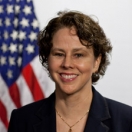
Yesterday, the President hosted the first-ever White House Demo Day to celebrate the important role entrepreneurship plays in America’s economy, and to hear directly from innovators who are turning their ideas into indispensable products and services.
Just as America is a nation of entrepreneurs, it is also a nation of immigrants. Indeed, the U.S. Small Business Administration (SBA) found that immigrants are more likely than American-born individuals to start businesses. And studies by the Partnership for a New American Economy found that more than 40 percent of Fortune 500 companies were founded by immigrants or the children of immigrant and immigrant entrepreneurs are concentrated in high-growth industries, starting more than 25 percent of all businesses in seven of eight sectors of the economy that the U.S. government expects to grow the fastest over the next decade.
Both of these rich traditions – entrepreneurship and immigration – were fully on display at White House Demo Day. Some highlights of immigrant entrepreneurs who joined the day’s events included:
- Christopher Ategeka of Prevail: Ugandan-born Ategeka, who lost both of his parents to HIV/AIDS, has dedicated his life to improving healthcare for those suffering from the disease. For his work, Ategeka earned a U.S. President’s Emergency Plan for AIDS Relief (PEPFAR) award. In 2013, Ategeka co-founded Privail with fellow University of California—Berkeley graduate Anwaar Al-Zireeni. The company is commercializing low-cost, early HIV detection technology developed by Al-Zireeni.
- Privahini Bradoo of BlueOak: Born in India, raised in Oman and New Zealand, and educated in Boston, Bradoo pulls from her diverse life experiences to make a positive impact in the world and lead her company, BlueOak, an electronics-recycling firm that harvests valuable precious metals out of old smartphones and TVs.
- Luis von Ahn of Duolingo: A Guatemalan-born serial entrepreneur and computer scientist, von Ahn’s latest company – Duolingo – is a free language-learning platform with over 100 million users worldwide.
- William Hakizimana of Export Abroad: A Rwandan native, Hakizimana was forced to flee his homeland on foot and live in refugee camps before moving to the United States with his family as a teenager. Now, as the CTO and Chief Data Scientist at Export Abroad, he helps U.S. manufacturers compete globally. The company’s software platform helps companies navigate international trade and increase sales by providing global market research, curated leads, and customer-management tools.
The Obama Administration is committed to honoring the legacy of innovation and competitiveness that has helped make our country great. Immigrants have contributed significantly to this legacy, helping to found industries and spur innovation throughout our country’s history.
We will continue to welcome immigrant entrepreneurs to our shores and are pursuing administrative reforms to clear the path for job-creating entrepreneurs.
For example, as a part of the White House Task Force on New Americans, the SBA is, in collaboration with local partners, hosting SBA 101 trainings for new Americans to highlight SBA tools and resources for immigrants and refugees who want to start or grow their businesses. SBA has also launched the “Made it in America” campaign to highlight new Americans who have used SBA services and programs to build their own small business.
And later this year, the Department of Homeland Security (DHS) will issue new policies that will, for the first time, clarify dedicated immigration pathways for entrepreneurs who seek to start and grow their companies here. Entrepreneurs who meet certain criteria for creating jobs, attracting investment, and generating revenue within the United States will be eligible for temporary status or a green card. More than ever before, these “startup visa” pathways will allow the world’s most promising and innovative entrepreneurs to innovate and hire here in America.
You can learn more about all of the extraordinary entrepreneurs at White House Demo Day here, and more about the President’s actions on immigration here.
Cecilia Muñoz is Director of the White House Domestic Policy Council.


